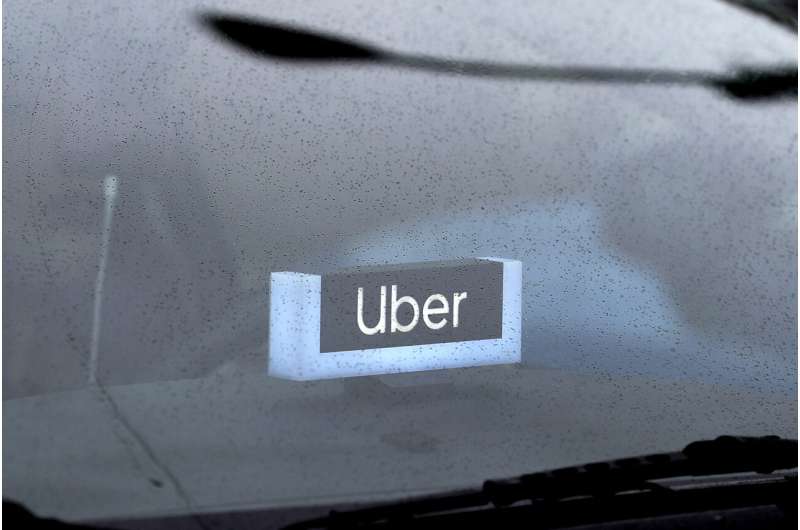This article has been reviewed according to Science X's editorial process and policies. Editors have highlighted the following attributes while ensuring the content's credibility:
fact-checked
reputable news agency
proofread
New rule tightens worker classification standards; Uber, Lyft say their drivers won't be affected

The Biden administration enacted a new labor rule Tuesday that aims to prevent the misclassification of workers as "independent contractors," a step that could bolster both legal protections and compensation for millions in the U.S. workforce.
Major app-based platforms including Uber, Lyft and DoorDash expressed confidence that the new rule would not force them to reclassify their gig drivers. But business groups warned the rule creates uncertainty for employers and much depends on how the Labor Department decides to enforce it.
The Labor Department rule, which the administration proposed 15 months ago, replaces a Trump-era standard that narrowed the criteria for classifying employees as contractors. Such workers are not guaranteed minimum wages or benefits, such as health coverage and paid sick days.
Labor advocates have supported the rule, saying employers have exploited lax rules to misclassify workers and avoid properly compensating them. In a report, the left-leaning Economic Policy Institute said construction workers, truck drivers, cleaners, landscapers, security guards and call center workers are among the most commonly misclassified workers. It estimated that misclassified construction workers lose between $10,177 and $16,729 per year.
The rule, while will take effect March 11, directs employers to consider six criteria for determining whether a worker is an employee or a contractor, without predetermining whether one outweighs the other. That's a change from the Trump-era rule, which prioritized two criteria: how much control a company has over its workers and how much "entrepreneurial opportunity" the work provides.
Advocates say the new rule offers a more comprehensive approach to determining whether workers are truly in business for themselves. In a briefing with reporters Monday evening, Acting Secretary of Labor Julie Su said misclassified workers "sometimes work side by side with individuals who are properly classified, doing the same work."
"But misclassified employees don't get paid for all of their hours," Su said. "They've seen their economic security eroded because of misclassification."
Potentially at issue for ride-hailing, delivery and other apps is a requirement that employers consider whether the jobs performed by workers are an integral part of the company's business.
Mary Kay Henry, president of the Service Employees International Union, which represents about 2 million workers, said in a statement that the new rule "takes direct aim" at the practices of corporations like Uber and Lyft that have taken "advantage of misclassifying workers to shirk accountability as employers, avoid paying their fair share and game a system already rigged in their favor."
But it's up to employers initially to decide how to weigh each criteria, which also include how much control the employer has over the worker, whether the work requires special skills, the degree of permanence of the relationship between worker and employer, and the investment a worker makes, such as car payments.
"This rule does not materially change the law under which we operate, and won't impact the classification of the over one million Americans who turn to Uber to make money flexibly," Uber's head of federal affairs, CR Wooters, said in a prepared statement.
Lyft also said the new rule will not force the company to change its business model, while warning that "this new guidance creates additional complexities and ambiguities for companies and courts alike across the country."
Flex Association, a group that represents major app-based rideshare and delivery platforms, said it will "seek to ensure implementation of this rule does not target workers who overwhelmingly turn to app-based platforms to earn supplemental income on their own terms."
The new rule comes at a time when more states are passing laws that guarantee a minimum wage and other benefits for app-based workers, including New York last year.
The U.S. Chamber of Commerce is considering challenging the rule in court, said Marc Freedman, the chamber's vice president of workplace policy.
Freedman said the new guidelines make it difficult for companies to know whether they are giving enough importance to any of the six criteria. He said it will depend on how aggressively the Labor Department decides to implement the rule, but the structure is biased toward classifying workers as employees.
"It leaves employers in the dark about whether they made the right decision," Freedman said in an interview with The Associated Press. "The only time they can be confident is if they call a worker an employee."
Jessica Looman, administrator of the Department of Labor's Wage and Hour Division, said during the briefing that the final rule isn't intended to apply specifically to certain industries or type of work. Asked about enforcement, Looman said the department will focus on the "most vulnerable workers," particularly those who are being unfairly deprived of minimum wages and overtime pay.
The rule does not carry the same weight as laws passed by Congress or state legislatures. Instead, it offers an interpretation of who should qualify for protections under the 1938 Fair Labor Standards Act.
Financial markets appeared to shrug off news of the new rule Tuesday. Shares of Uber gained 2.2%, while Lyft slipped about 0.5%. When the administration unveiled the proposed rules in October 2022, they dropped 10% and 12% respectively.
© 2024 The Associated Press. All rights reserved. This material may not be published, broadcast, rewritten or redistributed without permission.





















